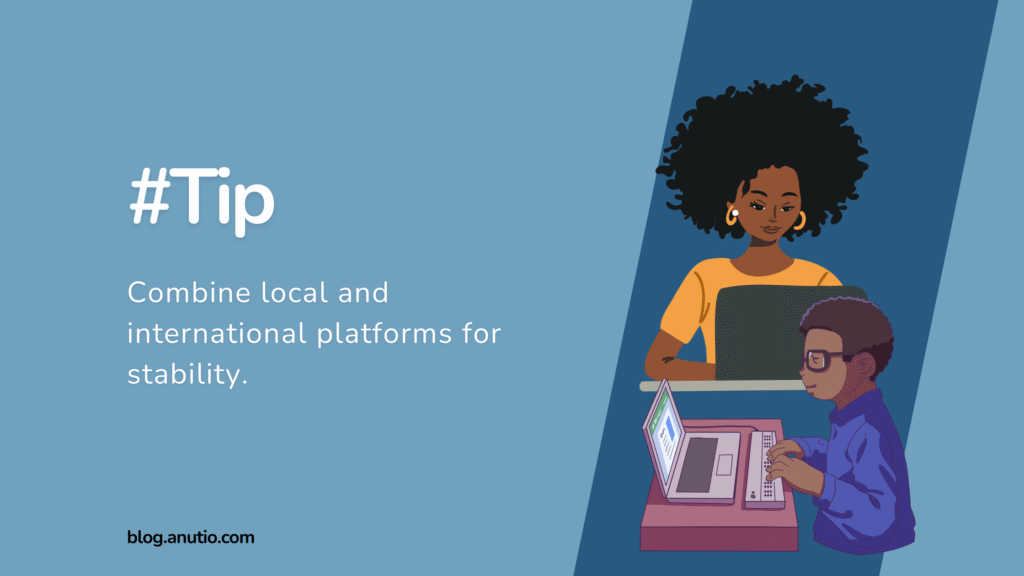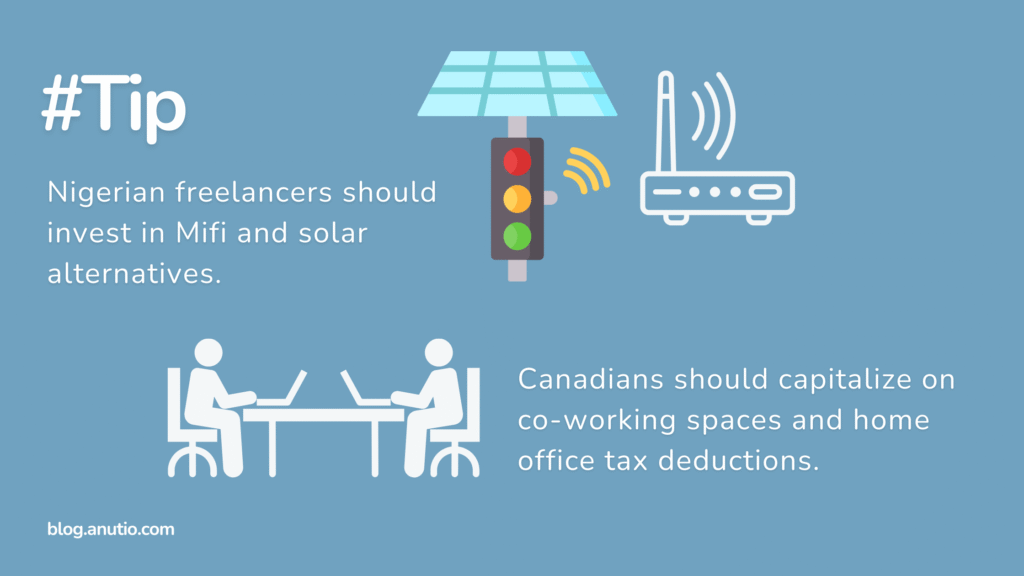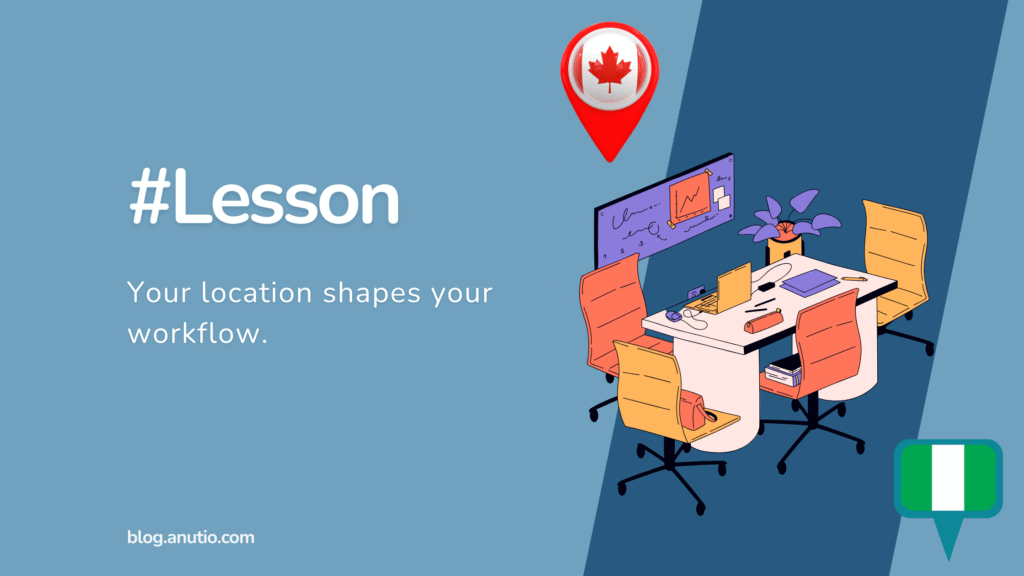So, you’re thinking about freelancing in either Canada or Nigeria—maybe you’re already doing it in one and wondering if the grass is greener on the other side.
Welcome to our guide where we tell it as it is. No fluff, no vague promises, just the truth about what freelancing really looks like in two very different economies. Whether you’re a Nigerian looking to expand internationally, a Canadian immigrant exploring side hustles, or someone trying to build a remote career, this article will give you real context, comparisons, and actionable advice.
Let’s break it down.
Let’s compare
Meet Kemi from Lagos and Seyi in Toronto. Both are brilliant graphic designers, passionate about remote work and carving a flexible career. Yet, their paths differ in major ways—from how they find clients, to how much they earn, pay in taxes, or even take time off.
Why is the gap so wide?

The Freelancing Boom: Global Trends in 2025
Freelancing is no longer a trend; it’s a full-on movement. According to a Statista report, over 1.57 billion people worldwide work as freelancers. Platforms like Upwork, Fiverr, and Toptal continue to expand their reach, offering opportunities for everything from tech jobs to translation gigs.
Canada’s freelance workforce now makes up nearly 28% of the total labor market (IWG Global Survey). Meanwhile, in Nigeria, the number of online gig workers has surged by over 50% since 2020, driven by youth unemployment and mobile penetration.
What does this mean for you? The competition is fierce everywhere, but the game is winnable—if you know how the rules differ in each country.
Economic Climate: Cost of Living and Earning Power
Let’s be honest. Your freelancing reality will be shaped by the economy you’re in. Canada ranks as one of the top countries for freelancers due to its strong digital infrastructure, high client demand, and stable economy. Nigeria, meanwhile, is Africa’s largest freelance market, with more than 30% of Nigerian workers engaging in informal gig work (Statista, 2023).
In Canada:
- Average freelance hourly rate: $35 – $100 CAD depending on skill (Glassdoor).
- Cost of living: High. Toronto and Vancouver rank among the top 10 most expensive cities in North America.
- Currency strength: Strong, stable.
In Nigeria:
- Average freelance hourly rate: $5 – $25 USD (depending on skills, client base).
- Cost of living: Moderate but rising due to inflation (over 30% in 2024, per NBS).
- Currency strength: The Naira has faced multiple devaluations in recent years.
Verdict:
A Freelancer in Nigeria earning in USD from international clients can live comfortably. A Canadian freelancer must earn more just to break even.
Freelancing Platforms: Who Wins Where?
Popular Platforms in Canada:
- Upwork, Freelancer, Fiverr
- Local platforms like Workhoppers and Jobboom
- Tech-specialized: Toptal, Gun.io
Popular Platforms in Nigeria:
- Upwork, Fiverr, PeoplePerHour
- Niche Nigerian platforms like Asuqu, Jiji Jobs, and Terawork
Platform Challenges:
- Verification problems for Nigerian users.
- Higher competition for immigrant freelancers in Canada.
- Payout delays in Nigeria due to payment gateway issues.

Legal and Tax Structures: CRA vs FIRS
In Canada:
Canada: Immigrants need a valid work permit to freelance legally. International students can freelance under limited conditions. The CRA (Canada Revenue Agency) classifies freelancers as self-employed.
More:
- You must file income under “Business Income”.
- Tax rate: Between 15% and 33% federal + provincial.
- GST/HST registration is required if you earn over $30,000/year.
- Taxes include federal income tax, provincial tax, and CPP contributions.
- Annual filing is mandatory using Form T2125.
Nigeria: Freelancers are expected to pay Personal Income Tax and no permit is required for citizens to freelance. There’s limited regulatory support and no national freelancer classification.
More:
- Many freelancers operate informally and miss tax filing.
Actionable Tip: Use platforms like Upwork or Toptal that verify and simplify documentation, especially for international freelancers.
Resources:
Bank Accounts, Payment Gateways & Getting Paid
In Canada:
- PayPal, Wise, Stripe, Interac, and traditional bank transfers work seamlessly.
- E-transfers are popular locally.
- CRA-compatible bookkeeping tools: QuickBooks, Wave, FreshBooks.
In Nigeria:
- PayPal is receive-only.
- Wise, Barter (Flutterwave), Grey, Cryptocurrency and Payoneer are preferred.
- Local fintechs like Flutterwave, Kuda, and Paystack help bridge gaps.
- FX withdrawal restrictions still apply.
Workaround for Nigerians:
- Use Grey to receive USD and withdraw locally.
- Create verified Payoneer accounts linked to Upwork or Fiverr.
Internet Access, Tools, Power, and Infrastructure
This one hits home.
Nigeria:
- Frequent power outages and high generator/diesel costs.
- Average internet speed: 15 Mbps (Ookla, 2025)
- Mobile data is expensive relative to income.
Canada:
- Uninterrupted power and broadband coverage. High speed fiber is common.
- Average internet speed: 125 Mbps
- WiFi is standard in homes, coffee shops, libraries.
Top Tools for Both:
- Task Mgmt: Trello, Notion
- Communication: Slack, Zoom
- Invoicing: Wave (Canada), Invoicely (Nigeria)

Lifestyle & Work-Life Balance
Nigerian Freelancers:
- Hustle culture dominates, and downtime may feel like a luxury.
- Extended family expectations.
- Limited work-life boundaries.
Canadian Freelancers:
- Emphasis on boundaries, vacation, and mental health.
- Government benefits like maternity leave.
- Stricter legal obligations (contract enforcement, NDAs).
Extra points: Know your context. A Canadian may enjoy better mental health support but stricter legal boundaries. A Nigerian may enjoy flexibility but with burnout risks.
- Use time-blocking tools.
- Join freelancer support groups.
Skill Development and Freelance Platforms
Canada:
- Free courses via Coursera (funded by the government), LinkedIn Learning.
Nigeria:
- Platforms like AltSchool Africa, Cousera (free with scholarship), and Skillshare.
Popular Platforms:
- Canada: Upwork, Freelancer, Toptal.
- Nigeria: Fiverr, PeoplePerHour, Turing.
Health Insurance and Benefits for Freelancers
Canada:
- Covered by public health care.
- Extras (dental, therapy) often require private insurance.
Nigeria:
- Freelancers often have no health coverage.
- Private plans can cost ₦25,000–₦70,000/month.
Consider HMO plans like AXA Mansard or Reliance HMO
Freelancer Communities and Networking Opportunities
Canada:
- Coworking spaces: WeWork, Staples Studio.
- Meetups: Startup Grind, TechTO.
Nigeria:
- Online hubs: Nairaland Freelance Forum, Twitter Spaces, TechCabal events.
- Offline events: Lagos Startup Week, Google Developer Groups.

Challenges and Opportunities in Both Countries
| Factor | Canada | Nigeria |
|---|---|---|
| Payment Issues | Rare | Frequent |
| Power Supply | Stable | Unstable |
| Client Access | Easier (local + global) | Mostly global |
| Internet | Fast | Intermittent |
| Community | Diverse and local | Mostly online |
Case Studies: Canadian Immigrant vs Nigerian Freelancer
Case Study 1: Aisha – Nigerian Freelancer in Lagos
- Graphic designer.
- Earns $2,000/month from US clients.
- Struggles with power supply and internet.
- Uses Payoneer for invoicing.
Case Study 2: Daniel – Nigerian Immigrant in Toronto
- Web developer.
- Earns $6,000/month.
- Pays 27% in taxes.
- Uses QuickBooks, Stripe, and a CRA-registered GST number.
How Anutio Helps You Freelance Smarter
Anutio is not just another Career platform. We offer:
- Career Mapping: Upload your CV or Resume on our Career Map and get detailed insights into skill suggestions and gaps you might not have been aware of. We ensure you have a complete document for your job applications.
- Job Matching: We give your clients space to find you. Start building your portfolio through your account to get found.
- Skill Building: Free webinars, expert guides and bootcamps where you gain access to amazing resources.
FAQs About Freelancing in Canada vs Nigeria
Q: Can I freelance from Nigeria for Canadian clients?
Yes! Use platforms like Upwork or pitch directly. Get paid via Payoneer.
Q: Do I need a business name in Canada to freelance?
No, but it’s recommended if you want to register for GST/HST.
Q: How can I avoid scams as a Nigerian freelancer?
Use verified platforms, never work without a deposit, and sign contracts.
Q: How much should I charge as a beginner?
In Nigeria: $10 – $20/hour. In Canada: $30 – $50/hour.
Q: Can I freelance in Canada as an immigrant? A: Yes, but ensure you have a valid work permit or PR status.
Q: What’s the best freelance platform for Nigerians? A: Fiverr and Payoneer-connected Upwork accounts work well.
Freelancing Isn’t One-Size-Fits-All
There’s no perfect place to freelance—just different pros and cons depending on where you are and what you need. Canada offers structure, resources, and a higher earning potential. Nigeria offers flexibility, cost savings, and untapped market potential.
The smart thing? Equip yourself with the right tools.






